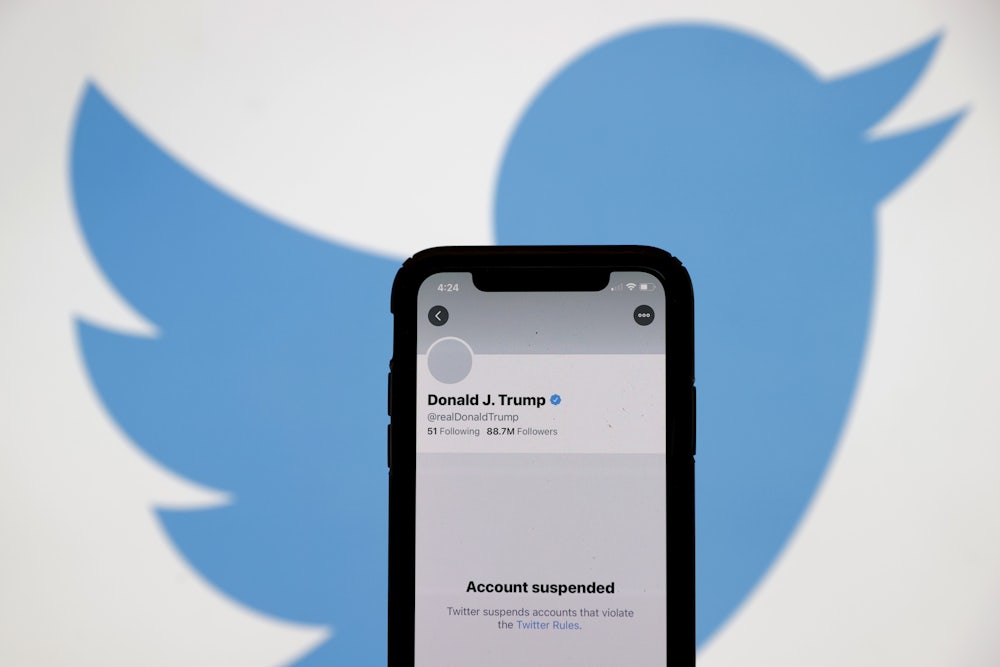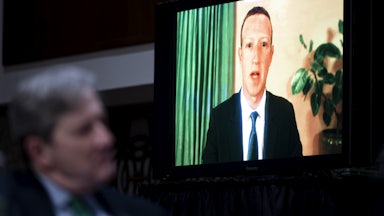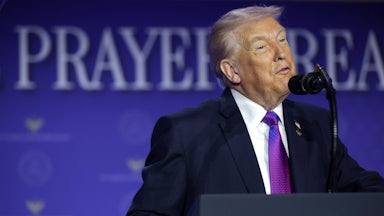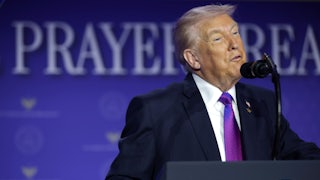Conservatives aren’t the biggest fans of social media companies like Facebook, Twitter, and YouTube these days. A common complaint in right-wing circles, especially since the Trump era, is that these firms unfairly discriminate against conservative viewpoints. The companies themselves argue that they’re only trying to ensure that their platforms are free from hate speech, calls for violence, and other unsavory content. Perhaps the most notable point of conflict between these two camps came after January 6, 2021, when Twitter banned former President Donald Trump for appearing to use its website to orchestrate a coup d’état.
On Tuesday night, the first legislative effort to tip those scales back toward conservatives hit a roadblock. The Supreme Court blocked a Texas law that would stop social media companies from removing posts on their websites for viewpoint-related reasons, dealing a major setback to conservatives’ efforts to tilt the playing field—at least as they perceive it—in their favor. At the same time, the dissenting opinion by three of the court’s conservative justices should give social media titans a hint of concern for the future.
The case, NetChoice v. Paxton, is a First Amendment challenge to Texas House Bill 20, which was signed into law last September. The law prohibits large social media companies from taking any actions to “censor” their users, which it defines broadly to include blocking, deleting, or demonetizing posts, on the basis of their viewpoints in most circumstances. A coalition of trade associations that represent major social media companies, which served as the plaintiffs in the case, argued that the bill would force them to host and distribute morally and ethically unacceptable content.
“HB20 prohibits covered social media platforms (many of which are members of Applicants NetChoice and CCIA) from engaging in any viewpoint-based editorial discretion,” the groups argued. “Thus, HB20 would compel platforms to disseminate all sorts of objectionable viewpoints—such as Russia’s propaganda claiming that its invasion of Ukraine is justified, ISIS propaganda claiming that extremism is warranted, neo-Nazi or KKK screeds denying or supporting the Holocaust, and encouraging children to engage in risky or unhealthy behavior like eating disorders.”
H.B. 20 only applies to companies with more than 50 million monthly U.S. users, which means it generally applies only to the most well-known social media companies, such as Facebook, YouTube, and Twitter. The groups argued that this threshold shows how Texas aimed to “[single] out a select few websites for disfavored treatment” by excluding “smaller social media platforms—like Truth Social, Parler, Gettr, Gab, and Rumble, which purport to appeal to more conservative users, even though they similarly exercise editorial discretion via their own policies.” (Senator Josh Hawley recently used a similar statistical threshold trick specifically to target Disney with a similar law, impacting the company’s copyrights, which was otherwise written to appear facially neutral.)
Texas didn’t really try to hide the political and ideological valence of H.B. 20. It sought to tackle what conservatives describe as censorship by major social media companies. “It is now law that conservative viewpoints in Texas cannot be banned on social media,” Greg Abbott, the state’s governor, wrote on Facebook when he signed the bill into law in September. In another post on Twitter at that time, Abbott complained that “too many social media sites silence conservative speech and ideas and trample free speech.”
Social media companies often argue that they’re using their own editorial judgment when deciding what content can stay or must go on their websites, which is protected by the First Amendment. If a state passed a law requiring The New Republic to host “conservative speech and ideas,” for example, it would be struck down by almost any federal court in the country. (H.B. 20, for its part, has a carve-out to exclude news media organizations.) Forcing a publication to carry speech with which it disagrees is a violation of the First Amendment, not a means to strengthen it.
Texas and its conservative allies aren’t foolish enough to try to overturn these basic First Amendment principles. So the state tried to argue around them by claiming that social media companies are “common carriers,” akin to the telegraph and telephone companies of yore. Courts have previously upheld some regulations that require common carriers to treat their users equally and impartially. You can see why this comparison would be appealing to conservatives who want to rein in social media companies’ decision-making. Among the idea’s potential proponents is Justice Clarence Thomas, who expressed support for it in a case involving former President Donald Trump’s Twitter account last year.
One problem is that the comparison doesn’t really make sense. Common carriers are often described—somewhat tongue-in-cheek—as “dumb pipes,” meaning that, like an oil pipeline, they play a passive role in facilitating the distribution of goods. If we apply that to the internet, the more appropriate analog would be internet service providers, which provide users with a connection to the worldwide web and only filter out what those users can access on it in extraordinary circumstances. Many of the best-known ISPs also happen to be telephone companies.
“Far from ‘hold[ing] themselves out as affording neutral, indiscriminate access to their platform without any editorial filtering,’” the groups noted in their brief, quoting from a 1979 Supreme Court ruling on video rental stores, “unrebutted evidence establishes that [social media] platforms constantly engage in editorial filtering, providing unique experiences to each user and limiting both who may access their platforms and how they may use the platforms.” In other words, companies like Facebook, Twitter, and YouTube aren’t just pipelines of raw content for users to consume but curators and editors whose judgment is protected on free-speech grounds.
To justify that intervention, Texas emphasized the unique role that social media companies play in modern civic life. “This Court has recognized, and Texas agrees, that the platforms have made themselves the gatekeepers of a digital ‘modern public square,’” the state argued in its response brief, quoting from past decisions and other judicial opinions. “Though they are not themselves news outlets, they have ‘enormous influence over the distribution of news.’ And they ‘provide perhaps the most powerful mechanisms available to a private citizen to make his or her voice heard.’”
A federal district court judge sided with the trade groups and blocked the law from going into effect. In an unexplained order, a divided Fifth Circuit Court of Appeals vacated that order and set up the possibility that the law would take effect. The Supreme Court’s 5–4 order to restore the status quo scrambled the court’s usual ideological lines, with Chief Justice John Roberts and Justices Brett Kavanaugh and Amy Coney Barrett joining with Justices Stephen Breyer and Sonia Sotomayor to prevent H.B. 20 from going into effect.
Like many shadow-docket decisions, it came without a written explanation for the majority’s rulings. Technically speaking, a ruling on a procedural motion like this one isn’t the same as a ruling on the merits. Justices who voted to block H.B. 20 from going into effect at this stage of the proceedings could still vote to uphold the law later. The reverse is also true, of course, but mainly for Justice Elena Kagan, who voted to leave the Fifth Circuit’s order intact without explanation.
Since Kagan did not join the dissenting opinion written by Justice Samuel Alito that appeared to sympathize with H.B. 20’s goals, her concerns may have been more procedural in nature. In that dissent, Alito wrote that it is “not at all obvious how our existing precedents, which predate the age of the internet, should apply to large social media companies,” which amounts to a tacit acceptance of Texas’s strategy on the First Amendment claims. Justice Clarence Thomas, who previously expressed similar views—and whose concurring opinion in the Trump case received multiple favorable citations from Texas in its briefs—joined the dissent, as did Justice Neil Gorsuch.
If you’re the CEO of a major social media company, how you view the vote count in Tuesday night’s order depends on whether you’re an optimist or a pessimist. A positive-thinking Facebook or Twitter executive could take solace in the fact that five justices weren’t willing to let the law go into effect. That could indicate that a majority of the justices agree with them on the First Amendment implications of the Texas law. At the same time, a more dour colleague could note that at least three of the justices were willing to allow the Texas law to go into effect and that the procedural nature of the order means more could join them later. It’s hard to read that as anything but vindicating for the right-wing campaign to rein in social media companies—and encouragement to keep up the fight.










